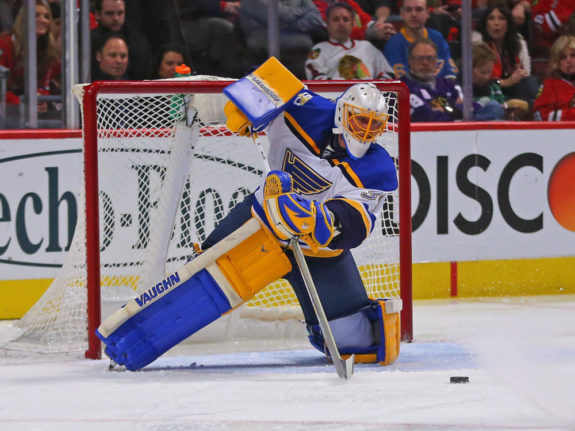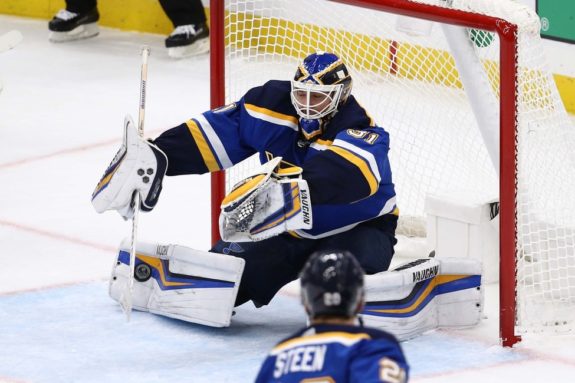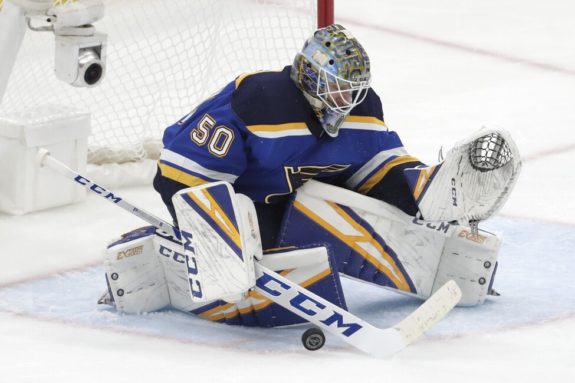The 2018-19 St. Louis Blues won the Stanley Cup Championship, the first in the history of the franchise. But, naturally, some players made a bigger contribution than others. In this series, we’ll look at the Blues’ star players, and see who made the grade and who needs to retake the test.
Jake Allen began the 2018-19 season as the St. Louis Blues’ unquestioned number one goaltender. He ended the campaign as a distant backup, watching rookie sensation Jordan Binnington carry his team to the franchise’s first ever Stanley Cup.
Based on that fact alone, it would be easy to assume that Allen was a total failure in the season. But a closer examination of his output suggests that, while he certainly doesn’t earn high marks, he may not be quite so bad as many assume.
Allen’s Rocky Start
Entering the season, many viewed the Blues as a serious contender after their impactful offseason acquisitions, most notably of Ryan O’Reilly. But doubts still remained about the viability of the team’s goaltending tandem. Carter Hutton signed with the Buffalo Sabres in the offseason, and the Blues turned to the pairing of Allen and Chad Johnson, a former Sabres backup himself.

Jake Allen
(Dennis Wierzbicki-USA TODAY Sports)
Chad Johnson
(Billy Hurst-USA TODAY Sports)
Allen struggled mightily out of the gate. Going 3-2-3 in the month of October, he posting a .874 save percentage (SV%) and a 3.99 goals against average (GAA). It wasn’t long before some questioned whether Johnson should replace Allen as the starter.
That illusion quickly evaporated, and Johnson went 2-6 with an .884 SV% and a 3.55 GAA in his short Blues’ tenure. Allen continued to struggle as well, going 10-10-1 in the months of November and December, though with much better overall stats, including a .912 SV% in that time. All told, by the All-Star break, he had gone 15-15-4 with a .897 SV% and a 3.04 GAA. Of course, by that point, it was already becoming clear that Allen was the Blues’ second best goaltender.
Binnington’s Ascension
By early December, it was certain the Blues needed a change. The team waived Johnson on Dec. 10, and called up Binnington, a little-known AHL goalie, at the same time. But it would still be most of a month until the newcomer started his first game, a shutout against the Philadelphia Flyers on Jan. 7.

It was on that same trip to Philadelphia where the team discovered “Gloria,” the 80s pop song that would become their Stanley Cup anthem. Binnington and the team had newfound confidence and momentum, and they won five of their first seven games with their new goalie in net leading into the break.
As the newcomer’s role increased, the veteran got less playing time. When Binnington claimed nine of the team’s wins on its historic 11-game winning streak, the debate was over: Allen was the backup, and the team had a new starter.
Of course, as has happened before in Allen’s career, when the spotlight shone elsewhere, he began to improve. After the All-Star break, he posted an impressive .924 SV% and a 2.26 GAA, although the Blues still went 4-2-4 with him between the pipes.
Perhaps the most remarkable stat of Allen’s season came in his home-road splits. At home, he was a disaster, going 8-9-2 with an .878 SV% and a 3.65 GAA. On the road, his record was a bit worse, going 11-8-6, but his performance was remarkably improved, at a .924 SV% and a 2.26 GAA. These splits seem to indicate that Allen felt the pressure of Blues’ fans distrust in him, and when he was away from home, he was able to play more loosely and more successfully.
A Team Player
By the time the postseason started, Allen was all but forgotten behind the new star that was Binnington. He played in just 10 games after February first, and there was no question that his era in St. Louis was over. But in all that time, Allen never once complained. He always said the right thing when asked, and voiced outspoken support for his team and his fellow goaltender.
Allen only played in one game in the postseason, in mop-up duty of a blowout during the Stanley Cup Final, surrendering one goal on four shots. But he was the consummate professional throughout the Stanley Cup run, helping his team prepare for their opponents and supporting Binnington however necessary.
In a strange and perhaps well-earned reversal of fortune, fans began to appreciate the once-maligned goaltender for his team-first attitude, and many former critics became supporters. So when news broke that the Blues planned to keep Allen as a backup, despite his high price tag, many fans were excited rather than disappointed. It was the role he’d earned through his positive attitude in a difficult situation after Binnington’s debut.
Analysis
Like many seasons in the recent past, the 2018-19 campaign started roughly for Allen. His statistics were awful, and the team struggled to find any confidence with him in net. Eventually, the Blues would turn to an unknown commodity in Binnington and find their goalie of the future, replacing Allen seemingly permanently.
Though his numbers improved dramatically towards the end of the season, and he showed himself a true professional by making the best out of a tricky situation, there’s no getting around the fact that this was the season where Allen proved once and for all that he would never fulfill his former moniker of the Blues’ goalie-of-the-future. On the bright side, he won back the fan’s hearts, and no other backup goalie got to hoist the Stanley Cup this season.